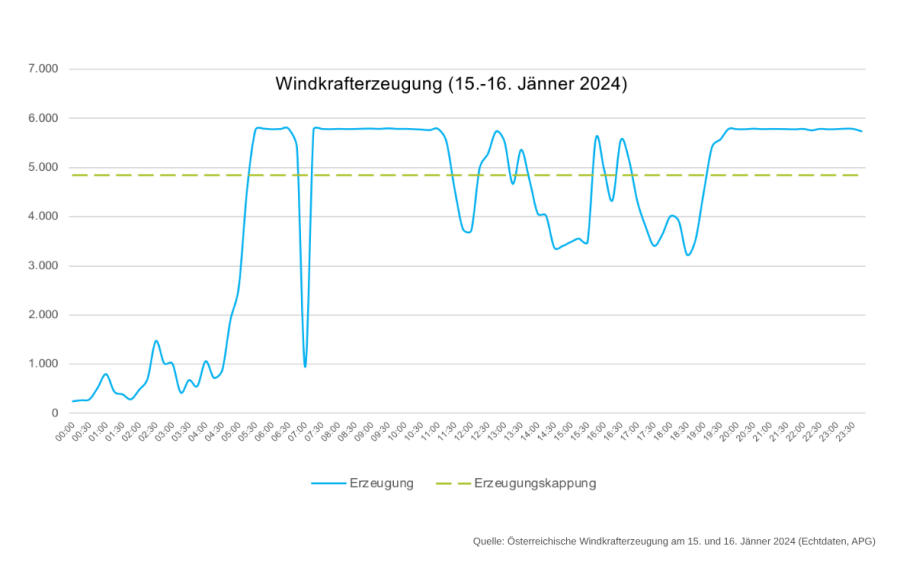Cap on wind energy as a
compulsory brake
With the new draft of the Electricity Industry Act, Austria is facing a far-reaching reform of the electricity market. In fact, it contains many elements for a sustainable energy system. However, one key point is causing great uncertainty: the so-called ‘peak capping’ – a measure that could turn out to be a real brake on the expansion of wind energy.
IG Windkraft recently held a press background briefing on this topic, at which Florian Maringer (Managing Director of IGW) and Markus Winter (CTO of Windkraft Simonsfeld) explained the reasons for our criticism to journalists.
What does peak capping mean?
Peak capping refers to the targeted limitation of the maximum feed-in capacity of generation plants into the power grid – usually at times of particularly high production. This instrument was originally developed for PV systems in the household sector to prevent short-term grid overloads. However, in the case of wind turbines – which feed into completely different grid levels and have a much more consistent feed-in characteristic – such regulation leads to disproportionately high energy losses and economic losses. While domestic PV systems are reduced slightly for a few hours a year, the same measure can have a significant impact on wind power projects. Capping just 2% of wind production can cost up to 20% of annual profits. This makes it impossible in some cases to finance new projects economically.
As an example of this, the days 15 to 16 January 2024 are cited, based on real data from an exemplary wind turbine in eastern Austria. Over a period of 48 hours, generation exceeded the intended forced brake (peak capping) by almost 24 hours. This was precisely at a time when the electricity system in Austria urgently needed electricity.

Threat to Austria as a business location
Wind energy is essential for supply during the winter months – precisely when PV and hydropower deliver little. The planned cap on feed-in would mean that cheap domestic electricity cannot be used, while expensive and climate-damaging gas-fired power plants remain in operation. At the same time, there is a risk of massive uncertainty among investors and project developers.
The peak capping would also jeopardise direct supply contracts with industrial partners (PPAs). If production is reduced arbitrarily and without advance notice, there will no longer be any price certainty – for anyone. This affects not only plant operators, but also industry and, in future, increasingly households as consumers.
Austria could lose around 4.7 billion euros in investments as a result – money that is urgently needed for the energy transition.
IG Windkraft calls for a rethink
IG Windkraft strongly criticises the planned measure and calls for, among other things:
- No forced braking for large power plants, such as wind power plants
- Legally enshrine differentiation according to technology and grid level Exceptions for hybrid and storage-integrated plants
- Introduction of modern flexibility management in the distribution grid
- Predictable and market-based grid services instead of arbitrary interventions
> Click here for the comprehensive statement from IGW (link)
Below are some press articles for further reading: